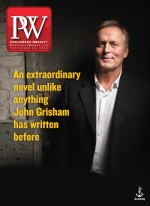In author Lee Wind’s novel, Queer as a Five-Dollar Bill, closeted teen Wyatt struggles for self-realization in the homophobic small town of Lincolnville, Ore. His life takes a confusing turn after an errant kiss leads him to “accidentally” date his best friend, Mackenzie. Though Wyatt doesn’t want to hurt her, “he’s not feeling what he knows he’s supposed to feel,” Wind says.
In the midst of these circumstances, an assignment about Abraham Lincoln leads Wyatt to a life-changing discovery: letters between Lincoln and his friend Joshua Fry Speed suggest that the two were in love. Wyatt makes a splash by publishing his findings online, and a storm of controversy ensues as his community rages against the possibility that a revered historical figure could be gay.
Wind has long worked to further diversify the publishing industry as director of marketing and programming at the Independent Book Publishers Association. He also has a blog called I’m Here. I’m Queer. What the Hell Do I Read?
The literary resource represents Wind’s ongoing efforts to guide readers through the difficulties he himself faced as a teen; Queer as a Five-Dollar Bill is his #OwnVoices story. Wind himself first learned of Lincoln and Speed’s relationship at a talk by Randy Harrison and delved into his own research. “I became convinced that Abraham and Joshua were in love,” he says. “And I kept thinking, if I’d known back when I was 15 that Abraham Lincoln was in love with another guy, it would have changed my whole life. He’s on Mt. Rushmore. He’s on the penny. He’s on the $5 bill!”
Initially, Wind wrote about his discovery in a nonfiction book, The Queer History Project: No Way, They Were Gay?, which focuses on Lincoln and gay figures throughout history. His aim was to break through the inaccurate and reductive ways that history is taught, and the focus on cisgender white men in particular: “Learning about Abraham and Joshua can be a crack in that facade that lets all this light from our real diverse history come shining through.”
The book was picked up by a Big Five publisher about four years ago but then sidelined and never published. Despite the setback, Wind didn’t despair. He had already started writing the novel that would become Queer as a Five-Dollar Bill. After completing it, rather than go the traditional publishing route, he crowdfunded on Kickstarter.
Within six days, Wind had received the funds he needed to publish the book. He fundamentally believes in the “democratization” of the industry that self-publishing offers—notably, by offering marginalized individuals more opportunities to tell their stories.
These days, Wind thinks a lot about an Anne Lamott quote from Bird by Bird, her book about writing: “Lighthouses don’t go running all over an island looking for boats to save; they just stand there shining.”
For Wind, it serves as a powerful metaphor. “A lot of my understanding of history, of LGBTQ history, is not what some people want to hear,” he says. “But I can’t worry about them. My job is to shine a light on what I’m passionate about—to tell these stories. If you’re interested, come closer and I’ll tell you all about it. If you’re not, no worries; do your thing and watch out—there are some rocks over there.”



 Volume 265
Issue 39
09/24/2018
Volume 265
Issue 39
09/24/2018





